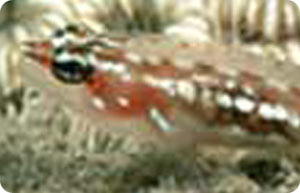A tiny fish that’s common in the western Pacific sounds like the James Dean of the oceans: it lives fast and dies young. Known as the pygmy goby, it lives no longer than two months -- a shorter lifespan than that of any other fish.
 The pygmy goby has the shortest lifespan of any known vertebrate. Credit: National Oceanic & Atmospheric Administration
The pygmy goby has the shortest lifespan of any known vertebrate. Credit: National Oceanic & Atmospheric AdministrationThe pygmy is one of perhaps 2,000 goby species. Some can grow up to two feet long. But the adult pygmy goby measures only about half an inch.
Even though that’s a bare nibble for many predators, that doesn’t stop them from stocking up on the little guys. The same researcher who measured the pygmy’s lifespan found that predators may snatch up as much as one-twelfth of the adult population every day.
A few years ago, researchers in Australia studied 300 pygmy gobies from the Great Barrier Reef. The scientists cut into the gobies’ “otoliths” -- small stones in the heads of the fish. These stones record the fish’s age like tree rings -- one “ring” for every day. The researchers found that none of the fish lived longer than 59 days.
As you might expect, the goby lives its life in fast-forward mode. After hatching, a larva stays in the open ocean for about three weeks. It then settles in a shallow coral reef, where it spends a couple more weeks reaching maturity. The mature adults live and reproduce for about a month. A female can lay eggs up to three times, with the male keeping guard until they hatch -- starting the high-speed cycle all over again.
So the odds are pretty good that of the millions of pygmy gobies that populate the oceans today, not one will still be around two months from now.

